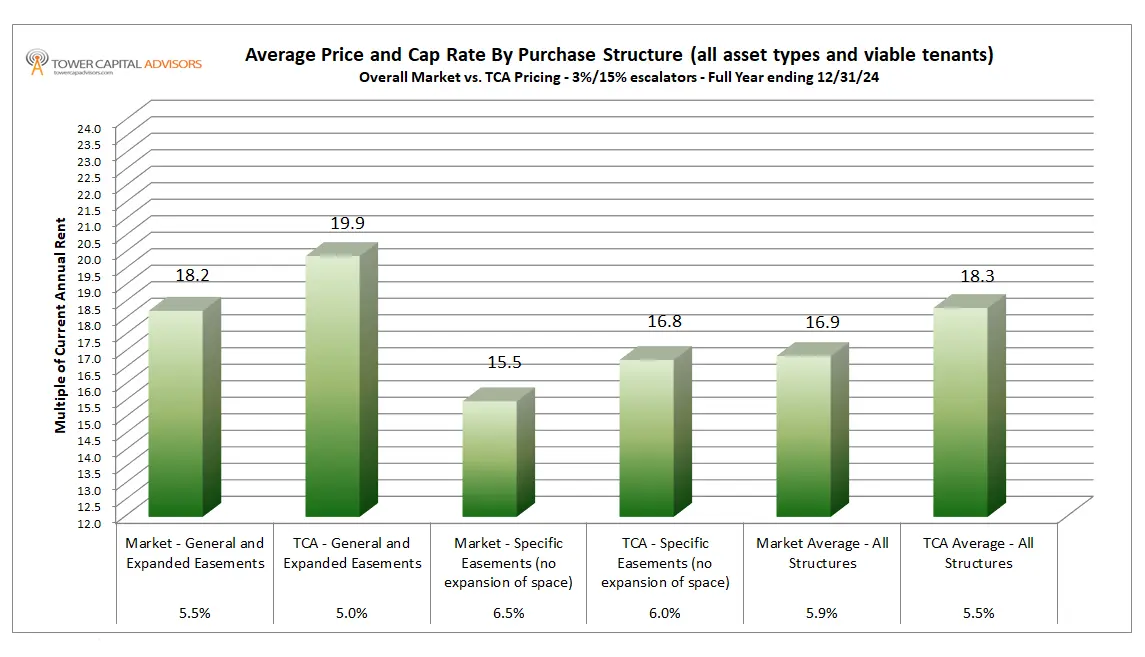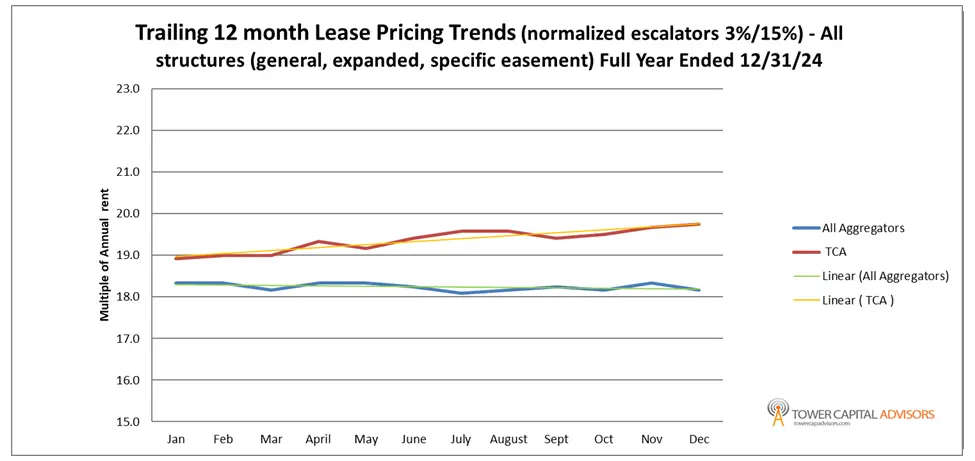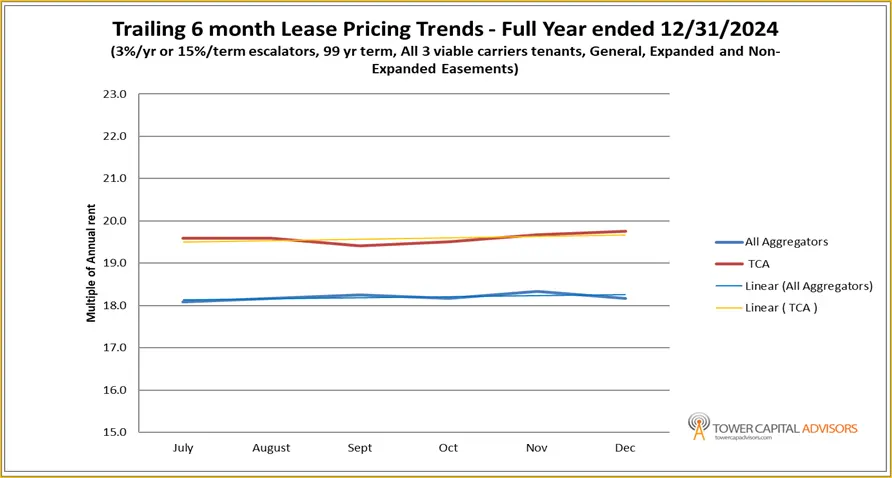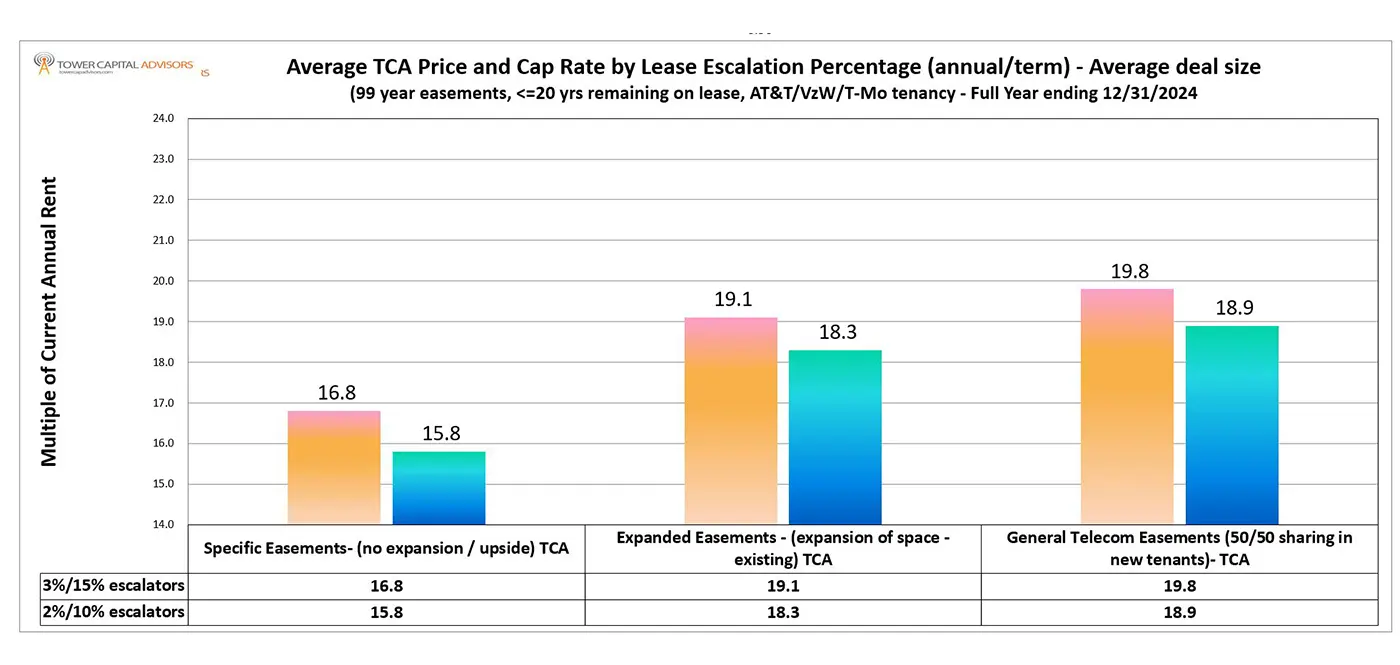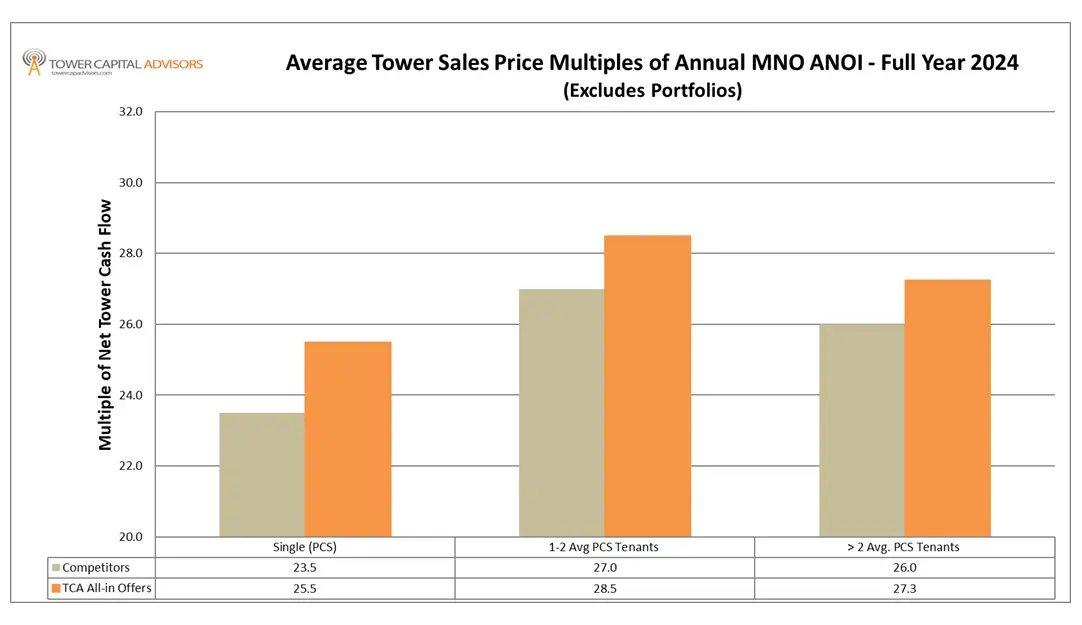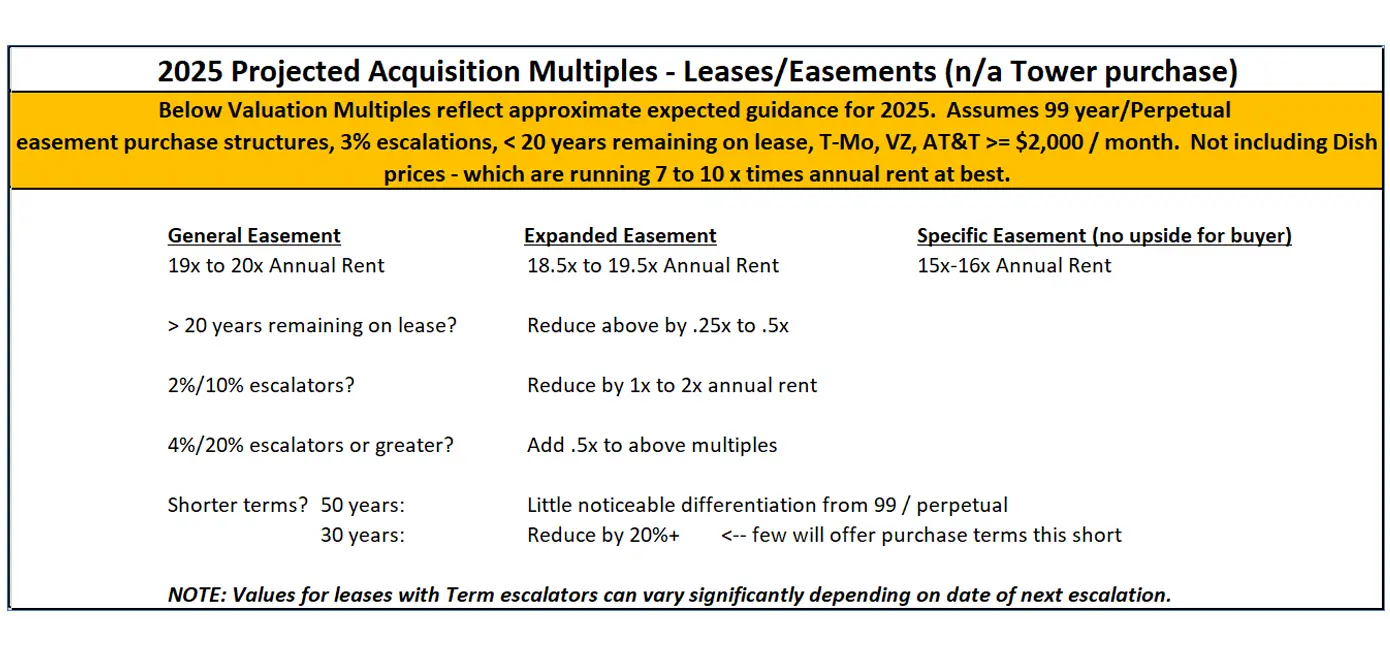Market Data and Values for Wireless Infrastructure from the Data We’ve Gathered
If you are a property or tower owner considering monetizing your wireless lease rents or an institutional investor trying to determine the value of lease/easement cash flows under wireless infrastructure, information on street-level market pricing is not readily available to you. Our Market Data section provides current, real-time insight into the market that could be of use to you as you weigh your options or undertake due diligence.
The various firms that offer to purchase wireless leases from property owners are motivated to do so as cheaply as possible. Having information on current lease offer trends is imperative, and TCA is the only firm to publish them. Knowing how much an asset is worth in today’s market is a must for a seller.
Full Year 2024 Update – Valuations and Historical Prices for Wireless Leases and Towers
TCA analysts track (confidentially) the offers for wireless leases and tower purchases made by aggregation firms to property owners that contact us, subsequent offers for the same assets from TCA and the overall trend of value for the leases in the industry. Based on a review of the full year 2024 data, we have distilled the following information and trends:
Note: Averages and valuations are calculated by TCA after reviewing hundreds of offers and closing each year and from discussions with both site / tower owners and industry personnel. They are opinion. Unless otherwise noted, most of TCA’s statistics are normalized for perpetual purchase terms and 3% per year (or 15% per term) escalations, as they are the most common in the industry. Lower escalators would result in lower offer prices. Higher annual escalators could result in higher than average offer prices. Data also nets out short-term expiration purchase offers (offers for leases with 5 or fewer remaining years in the lease terms provide a pro forma rent hike opportunity for the buyer).
TCA Tower Acquisitions and Valuation Data
Tower Capital Advisors currently performs a regular service as part of our scope of work as a national partner of one of the 3 major carriers that requires us to analyze, structure, evaluate and price numerous tower and rooftop leases being acquired for our own account or for AT&T directly. Our own acquisitions are consummated with one of two well capitalized funds or on behalf of our carrier partner. If you own one or more cell towers with cellular tenants, we believe our expertise in maximizing the value of these assets would benefit any current or future seller of wireless infrastructure.
In addition to suggesting that you view our Recent Transactions page (updated quarterly), below we have provided data from our 2023 tower acquisitions that we hope you find useful:
TCA Commentary – 2024 year in Review – Interest Rates cause a retreat from valuation highs for most, but not all, buyers at a time when sellers are numerous:
With rates continuing to remain high, many, but not all, buyers have exercised discipline as their cost of debt financing has risen. As property owners age and economic uncertainty abounds, more sellers are looking to divest or monetize their assets. While Q1, 2025 seems to have bounced back, 2024 continued to see some softening in valuations and offer prices. Again, for the full year 2024, we saw tower prices pull back from their record highs. Lease-only/easement prices took longer to pull back and more noticeably saw a reduction in the number of buyers able to sustain historical highs. Peaks of 21x for leases with the big 3 carriers and 3% or higher escalations are still available, but from fewer players. In 2024, the equivalent cap rates for these transactions were, on average, just over 5% for leases and in the high-3% to low-4% for towers.
Post pandemic, commercial properties still burdened with few re-finance alternatives continued to price at less favorable cap rates than wireless infrastructure. Thus, prices for this asset class continue to stimulate wireless lease landlords to monetize and tower owners to sell.
As those familiar with the space during the 'Great Recession' know, difficult and uncertain times drive more sellers to the market but a lower percentage of those transactions end up getting done. 2024 was such a year. Based on our data, signed contracts to sell individual wireless leases increased by almost 50% but closing rates decreased as obtaining lender consent to release collateral became more difficult. That being said, 2025 is off to a vigorous start and many of transactions have now cleared lender hurdles.
Market Outlook for 2025 for Wireless Leases and Cell Towers
Despite employers demanding their employees actually come to work in the office, vacancy rates have not peaked and stand at a national average of 19% with some markets seeing numbers as high as 30%. Combined with looming bullet maturities on their debt, this does not bode well for cap rates associated with commercial office real estate in 2025 and wireless infrastructure will continue to be an attractive, REIT qualified alternative.
What does the future hold for the value of wireless leases and tower assets?
Here are some of our thoughts:
As it relates to lease/easement purchases - more Seller's are coming to market with fewer likely being prevented from closing by their lenders, who may also want to pay down debt with the proceeds. We are already seeing an increase in tower portfolio sales and suspect a number of aggregators of both easements and towers will look to exit as well. Commercial defaults are on the rise and the lack of affordable refinance alternatives are going to make obtaining lender consent to sell easements more difficult in the coming year.
As it relates to tower values – with Dish's financial future up in the air, we believe lease-up and new builds by the remaining 3 investment-grade tenant credits will increase over 2024. To date in 2025, we have already seen tower portfolio values increase again with a sweet spot of 1.2-1.7 BBE driving them into the low 30's.
Pricing Projections: In the near term (1-2 years), and based on our opinion only, absent a disruption in the capital markets, lease values should stabilize, albeit with fewer bidders at the top end of the pricing spectrum.
Factors that can impact pricing in the coming year include:
- Inflation, and the resultant increase in the cost of borrowing for the buyers of these assets. Depending on how the Fed reacts to market dynamics related to tariffs, high rates will continue to impact the cost of funds of the buyers of these assets and with that can come decreases in prices to the sellers.
- Commercial real estate businesses and values may continue to decline as vacancy rates increase and/or retail establishments see a decline in revenue if a recession materializes. Reduced debt-service-coverage ratios may mean banks that hold mortgages on commercial properties that have cellular revenue will be less likely to attorn (consent) to the sale of those assets. Such consent is a requirement of 97% of all closed lease sales and by all buyers in the space.
- The number of buyers may eventually be reduced as firms that are not capable of competing exit the business or fail. Less competition will mean lower prices. This happened in 2008-2009 and may happen again, especially with new, less experienced capital entering the market.
Our recommendation is that landlords and tower owners consider monetizing these assets while the market continues to be reasonably hot. Further, if a property owner is also looking to sell the underlying property / business / building that wireless infrastructure is on, they should sell the wireless leases/tower first and THEN look to divest the actual property. This is because the cap rates on wireless leases will continue to be lower (meaning higher prices) than they are on the underlying property.
Other Valuation Considerations
For lease/easement sales, buyers focus is on possible upside via expansion of the size of the easement being purchased and shorter remaining terms on the leases:
The most significant (positive) differentiation in pricing for both rooftop and tower ground leases can be seen in offers structured with upside potential (real or perceived) for the buyer. The highest prices in the market today for lease/easements are available to sellers if;
Their lease and all renewals expire inside of 20 years or sooner,
Their escalations are at 3% per year or 15% every 5 years or higher,
They are willing to accept a general or expanded easement purchase structure.
The first characteristic (nearer term expiration) provides an opportunity for the buyer to increase rents. Note that this is in spite of the fact that in more than 50% of the cases we have seen in the last 20 years, rents are REDUCED at lease expiration.
The second characteristic that optimizes a sellers price is the escalation provision. For a given price, yields to the buyer are, of course, lower if the escalation in the lease being acquired is low and that is reflected in a lower price.
The third opportunity for buyer upside comes from expanding their easement area. The highest offer prices for tower ground leases and rooftop leases are coming with general and/or expanded easement areas that hope to capture either new tenant or expansion needs by existing tenants down the road. Offers to share with the seller in this potential future upside tend to only be structured for new tenants and range from 50/50 to 70/30 in the sellers favor.
Despite this uptick in value and price, initial offers made by the firms that use outbound calling and mail to contact landlords with wireless leases on their property continue to lag the pricing available from firms without marketing staff.
We recommend sellers who have been ‘cold-called’ by prospective buyers of their leases reach out to TCA to determine both the pedigree of the buyer (are they brokers or actual buyers?) and whether the price being offered represents the true value of their asset. Tower Capital does not make outbound calls to try and buy leases or towers. In addition to working with AT&T at their request to acquire their towers or leases, TCA responds to inbound inquiries only.
While landlords to the carriers and tower companies are enjoying this recent sizable uptick in prices based on a buyers potential upside potential, do not expect such offers to be simply crafted. Many require general telecom easements across the entire property allowing the buyer to ‘market’ the property for additional tenants while offering sharing arrangements back to the landlord in any new rent ‘found’ (or more often fortuitously happened upon). The probability of finding additional tenants for a site remains low as there are both fewer viable ones (AT&T, T-Mobile and Verizon) and the tenants themselves have a strong preference as to who is managing a property with most preferring to avoid properties managed by tower companies (particularly public ones) altogether. We also continue to believe that strategic acquisitions of rooftop leases that offer seller’s sharing in new tenant revenue can be conflicted with the buyers interest in locating new tenants on their own towers rather than on a rooftop that requires a split with the property owner.
Additional Information for Wireless Landlords and Prospective Sellers
Tower Company offers for their own ground leases: The public tower companies have demonstrated that they are quite interested in protecting their tower assets and in defending against 3rd party acquisitions of ground leases under their towers. As you can see from the above chart, TCA has managed to stay ahead of most of their initial offers for their own leases as they are made through their vendors who must be compensated. We continue to recommend that landlords to tower companies who are approached by their tenants to extend, amend or sell their current leases seek professional advice before doing or signing anything. TCA offers a much simpler closing process, documentation and shorter closing time (absent a need to get the consent of a mortgage holder, closing time should be less than 45 days vs. times 3 to 5 times longer to close with some of the public tower companies). Shorter closing time means lower legal costs for the seller.
Near-term expiring tower ground lease pricing: While offer prices for ground leases under cell towers have seen a recent modest increase in price, offers for ground leases under towers with multiple tenants whose final expiration is within a 1-10 year time frame have reached extraordinary levels. TCA continues to recommend that property owners with leases whose final expiration is coming due in the next few years not sign extension amendments or lump sum offers without consulting with an expert. We provide pro bono estimates of value for tower ground leases meeting this criteria to all property owners.
Who Is a Buyer and who Is a Broker?
Here are some of our thoughts:
The influx of formerly employed sales staff from now departed acquisition firms into the market has reached astounding proportions. The number of ‘brokers’ or intermediaries operating in the market offering to either advise sellers for a fee or seeking to broker their transactions to one of the few actual portfolio buyers for a fee is now well into the double digits. We have seen a number of these brokers attempting to arbitrage huge profits at the expense of the seller, so caution when dealing with them is advised. Note TCA does not charge private property owners for our advice, regardless of whether we do a transaction with the seller or not.
In 2023, we continued to see a number new broker platforms emerge in the market. Taking an offer from a broker vs. a capitalized firm may mean your asset gets shopped to many potential buyers in exchange for a profit for the broker. Signing an LOI with a broker vs. directly with a well capitalized fund means you are leaving an undisclosed amount of money on the table.
TCA cautions prospective sellers that offers by buyers to ‘share’ in rent increases above ‘scheduled rent’ at lease expiration or renewal should be viewed with suspicion or ignored when evaluating purchase price and structure, especially if there is a Right of First Refusal in your lease. Those transactions are highly likely to be favorably amended for the tenant by the buyer post closing.

